Illustration by Alice Wellinger
It was a gray day on the outskirts of Berlin, of the sort that makes the search for truth seem farcical. The gods chuckled through the unrelenting cloud cover as I dragged my suitcase through patches of gravel. What hubris to think that on this very day I could simply walk into the German Federal Archives and learn the history of my grandparents in relation to World War II. My grandmother’s voice echoed in my thoughts: “This history doesn’t belong to you, and you will never understand it.”
Small droplets began to spit from the sky as the bunker-like structure came into view. Could the truth be hidden in there, and would I find it? I met a stranger on the road, a researcher who guided me and gave me some tips about working in the archives. “So many documents were lost and destroyed during the war—you’ll be lucky to find anything,” she said.
I had been raised to believe that my maternal grandfather, my Opa, whom I had met as a toddler but couldn’t remember as an adult, was a farmer who only wanted “the best.” He had managed land in Poland during the war, I had been told, and in 1960 had resettled in Brazil, the land of my birth, where there were better land prospects. He was obsessed with work and being “correct.” That was the truth delivered to me in childhood—perhaps to protect someone, though I am not sure whom. The manner of delivery was often indignant and left me burning with shame. Because I was a child and a grandchild, this person, my Opa, had to be explained.
When a family stifles its own history, it leaves an indignation that easily tips over into rage. In the maelstrom of explanations about my grandfather that came from my grandmother and other family members, a defense of the indefensible and shards of an old ideology swirled: The strong had the right over the weak. People from the East were dirty and lazy. Hitler did many good things that no one remembers. The Holocaust was a contrivance of the international media and never actually happened. By the time I was an adult, my primary concern was to accept the shame of a family past I was beginning to surmise, so as not to unleash certain fury.
Experiencing the shame that comes from silence about the past is like walking blindfolded past a movie screen playing a grainy black-and-white film, with the volume turned low. The moving pictures explain and reveal, and you can hear them taunting you in every move and in every thought. You just can’t see them or make out the words. While it was barely possible for me to scrape by in this state of being as an individual, parenthood made it take on a different significance. It wasn’t just me living with it any more. My hope that my children might walk the earth with lighter spirits than I had, and my experience of the asphyxiating effects of shame and silence on family relationships, had brought me to this gray road leading to the archives, which were a repository for crimes against humanity.
With every step I took, I could see the furrowed eyebrows of several of my friends. They had already guessed what I might find out, given my birthplace in Brazil and a German maternal family who had spent the duration of the war in occupied Poland. Why open up this Pandora’s box, and why not enjoy the gift of freedom and peace that the time I had been born into granted me? Why let in such ugliness, when I’d had nothing to do with it? My friends’ concerns were born out of goodwill and love, but perhaps also out of the instinctive human fear that we might just catch a glimpse of ourselves in the barbaric past. I registered their concerns superficially, but inwardly saw no other path. It wasn’t the pure virtue usually associated with the search for truth that drove me. How could it be, when several in the extended family, including my grandmother, with whom I had shared a close relationship, would feel insulted and hurt by my investigations? Rather, it was desperation, the unbearableness of continuing to walk blindfolded, and the desire to spare my children this condition.
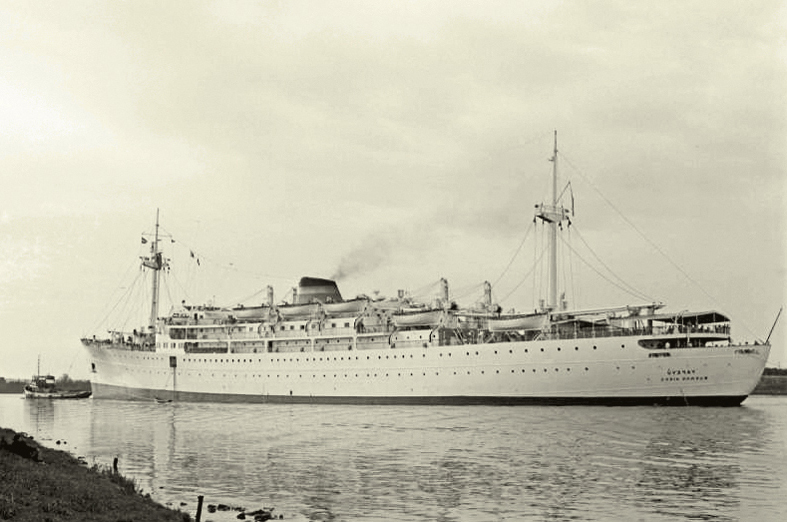
Doubt and fear, the guardians of truth, stood stalwart as the clock in the Federal Archives reading room ticked on, and the archivist’s fingers typed my grandfather’s name into the search window. Each stroke beat on my heart like an executioner’s drum, until the archivist declared in a calm and neutral manner that approximately 100 pages about my grandparents had been found. These included their extensive application documents to enroll in the SS as a married couple, and records of where they had been stationed in occupied Poland throughout World War II. I had once asked my grandmother, my Oma, whether her husband had been SS. “Wherever did you get such a bizarre idea?” she said. Now my illusions were shot to pieces, and a dreadful anger welled up about the untruths I had been weaned on.
Collapsed in a corner of the hallway outside the reading room, I called my husband. “They were SS,” I mumbled through the tears, but as I said the words realized it was just a label, and if I wanted to know what those papers really meant, I would have to do the work. The grainy black-and-white film had begun to come into focus before me. But what did it really mean?
After a year of inquiry with experts and endless reading in which I searched every line for the truth about what my grandparents had done, I found that the documentation about my grandfather was not limited to one archive. It was spread across several in Germany and Poland. After superhuman efforts by a young Brazilian-American researcher to retrieve my grandfather’s death certificate from a dusty office in the interior of Brazil, the Polish archives not only agreed to share the files but also declared they were treating me as an honorary Polish citizen and thereby expediting the process. The search for truth about our human past may be ugly, but acts of kindness great and small give hope.
In Poland, a young, energetic archivist named Robert Nowicki sat next to me as I faced a pile of testimonies filed in a local court in 1946—including accounts of beatings and other forms of torture that brought the victims close to death—and a formal request for my Opa’s extradition to Poland for trial. Robert translated some of the worst for me, ignoring the rules of the Polish National Archives. Despite the head shot in the files, which I recognized, and the facts on the page, every cell in my body revolted against the idea that this could be my Opa.
On the following morning—a Saturday, which he could have spent with his wife and young son—Robert climbed into a rental car with me to find the areas where Opa had been stationed with his family. “We will try to find the people in the documents,” he said, resolutely patting the pile of papers on his lap in the passenger seat. “I love this kind of work. It’s the real history,” he smiled. I could only return a cursory smile. I wasn’t prepared to meet eyewitnesses and victims.
Seven hours later, we had met three of them. One hesitated to shake my hand. Another was emotionally transported into a scene of execution at the mention of my grandfather’s name. Seeing the terror in the whites of his eyes, I begged for the provocation of memories to stop. Robert insisted we continue, and the third, a kind man in his 80s with a noticeable scar over his eye, invited us to his table where his wife and grown daughter served us freshly picked cherries and drink. He had worked on Opa’s estate as a young boy with his parents and siblings, but when I asked about my grandparents’ children, he couldn’t remember any. I felt relieved until other irrefutable evidence emerged, and soon realized that a 10-year-old Polish child might not remember German children he was forbidden to mix with. His life was one of survival in the fields and of avoiding the whip.
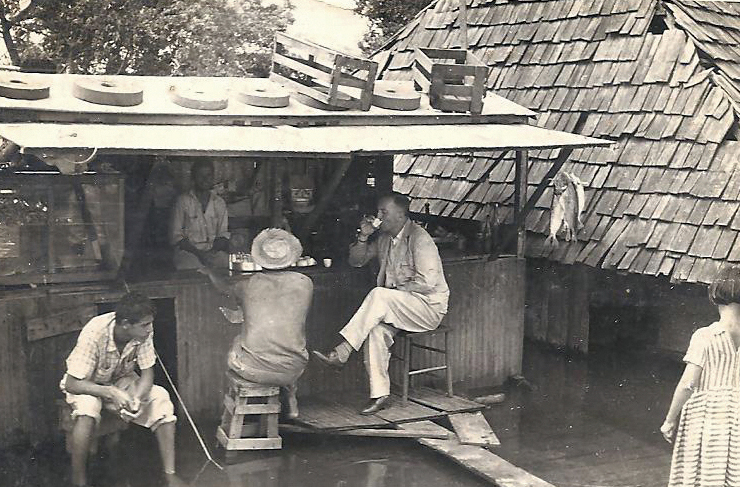
The author’s grandfather (right) having an espresso on his way into the interior of Brazil during the 1960s.
“It wasn’t your fault,” he said, grasping my lower arms at the end of our three-hour conversation in which his wife and daughter occasionally stroked my back and shoulders in sympathy. I stared with inextinguishable sadness at the wound Opa had inflicted on a 10-year-old boy who had forgotten to remove his cap when he walked past him. It was the law, and Grandfather was always “correct.”
“They would have strung him up if he hadn’t done as he was told,” my grandmother eventually said of Opa, as she tried to explain away this brutality when, later on, I confessed what I had learned to her. It was another untruth. The law also said that Opa could manage his estates as he liked, and, pumped with propaganda, he did exactly that. Opa gained his last prestigious posting during the war to a palace in southwestern Poland—only “the best.” The previous occupant hadn’t been sufficiently fanatic, apparently.
At the end of that very long day in which Robert and I hadn’t eaten more than a few cherries, I bought him two cheeseburgers at a McDonald’s. My thanks to him would always be ridiculously out of proportion to what he had done for me.
“So, are you satisfied with what we found?” he asked, chomping on a burger. I couldn’t answer the question. What had my quest given these people except to reawaken bad memories? I began to wonder whether the search for truth always has to be a selfish act. I looked across the table at Robert. Why was he here? Was it just his delight in the “real” history, the human contact of fieldwork rather than the dull paperwork of the archives? The fact that he turned up and accompanied me on every subsequent visit I made to western Poland raised my hopes that there might be a healing in what we were doing.
Yet there were many I would meet who didn’t seem to find any healing in too much truth. In villages in the countryside west of Hamburg, where my grandparents had lived before and after the war, I met many who felt my questions showed a lack of understanding for local sensitivities. By omitting the history of 1933 through 1945 from their mental timelines, communities had been able to build up a functioning social fabric. The nation had fallen to its knees before memorials many times. Wasn’t it enough? Why this nonsensical and fruitless resurrection of old stories?
I visited a local museum created by former employees of a successful regional textile business that lifted the whole region out of the embers of war, and I encountered happy faces wanting to talk about the economic miracle that happened there in the late 1940s. However, my purpose there was much less cheerful: to learn about a man named Baum who had publicly denounced my grandfather for acts he had committed in the East after the war, and who had most likely been a catalyst for my family’s flight to Latin America.
My research revealed that Baum was a senior member of the Waffen-SS who had been personally decorated with medals of bravery by Adolf Hitler himself. He had served on the Eastern Front, where the Waffen-SS had been responsible for many atrocities.
Here in this factory museum, Baum was lauded for having helped to build a business that had given people a lifeline out of the ruins. “He was Wehrmacht,” they said, meaning that he was a good soldier, not one of those scoundrels from the SS. My grandfather’s reputation for brutality had left a long trail, and the intention was to contrast Baum’s character to Opa’s. I had no desire to defend Opa; rather, I wanted the facts. I asked the most senior of the former employees whether he knew if Baum might have been the impetus for my grandparents’ hasty departure. He peered through his square-framed glasses and said, “How nice for you to have been born in Brazil.”
Whose truth was most valid? Mine about Baum’s sinister Waffen-SS history or the employees’ about his considerable post-war achievement in helping many out of starvation by creating jobs? Could one excuse the “minor” untruth about the Wehrmacht? Was my need for clarity just pedantry? My life had most likely been shaped in a positive manner by Baum, just as theirs had. What was the problem?
During my travels in Latin America, which miraculously came about through Wellesley’s Mary Elvira Stevens Traveling Fellowship six years into my research, I found an answer. My first stop on this journey, the purpose of which was to map my grandparents’ lives after they had swiftly left Germany, was Asunción, Paraguay. Waiting for me at the airport was my 80-year-old uncle and his two children.
For the past 40 years, I had been told my uncle was dead, but I had found him and his family with the help of a shrewd Brazilian IT expert. His children, a man and a woman both in their 30s, had tried to find their father’s family outside of Paraguay, but because they could not get any information from their father, their efforts had been to no avail. With my arrival in Asunción, the era of silence in their family had ended.
As I got to know my cousins, I also learned of their desperation. Outwardly, we were strangers, but inwardly, we recognized one another’s emotional landscapes immediately. They had lived with their father’s unspoken trauma, which had expressed itself in indignation, in fury, and in the shards that swirled in the maelstrom. Opa had taken his violence home with him, abusing his own, and the effects had trickled through the generations. We identified with the physical and mental punishments that we had inflicted upon ourselves through self-destructive behaviors—the manifestation of a shame none of us had truly understood.
I shared the family story with them, and we wept. They took me to Iguazu Falls, one of the wonders of the world. There, in the power of the majestic falls, we symbolically cast our shame away by throwing rocks over the edge. This was not a forgetting. It was the undoing of our blindfolds, our understanding of the source of pain, and our compassion for one another. As we walked along the great river that flowed from the falls, I felt drawn to the current. It was like the six years I had spent struggling with the truth. It was never-ending, and it didn’t bear asking why. It just flowed. My cousin Karl put his hulky arm over my shoulder as we watched the great river, which was like the truth that could never be captured in its entirety.
There were few moments in my journey when I was not afraid. A group of academics in São Paulo, Brazil, preparing me for my journey into the interior, warned me that they had received threats, most likely from the descendants of perpetrators who had successfully escaped. Files vanished from archives when they went to do their work. The transparency and safety we are used to in doing our research about this period of history in the developed world doesn’t exist in an environment where corruption is the norm. I was reminded of this as Rodnei, my interpreter and a genealogist with an irrepressible sense of humor, drove into the heart of Brazil past placards protesting corruption in government.
When I had gathered so many facts that I knew for sure that my grandparents had been standard-bearers in history’s most destructive human experiment, my hands shook, but this was not good enough a reason to avert my gaze.
Opa had been a Special Führer for Landed Domains in East Prussia and Poland, responsible for transforming western occupied Poland into the breadbasket of the Third Reich. Integral to this task was the deportation, torture, enslavement, and murder of the local population. Opa hadn’t served at the front. He’d done all this among unarmed civilians, far behind the front lines. He dictated the law in his own domains, and it was not only merciless, but sadistic.
He had joined the party in 1931 before the Nazi takeover of power and was a believer rather than a pragmatist. He was an avid equestrian, and when his riding association was organizationally “aligned” with Himmler’s SS in 1934, he joined that organization, too. The SS offered status and many other benefits. In 1939, he wasn’t a youth drafted unknowingly into the war; he was a 34-year-old adult with a family. The possible reasons for his susceptibility to extremism are many, going back to the circumstances of his birth. He was born out of wedlock to parents from different social classes in a rigid hierarchical society that judged him. Feelings of inferiority are often the reasons people commit crimes, but they are no excuse.
He and Oma left the Federal Republic as war-crimes trials restarted in the late 1950s, and as an office for the prosecution of war crimes was established in Ludwigsburg in 1958. In the same year, members of a former SS policing squadron were tried and given long-term prison sentences in a court in Ulm. For the first time, the argument of “following orders” was to no avail. These cases were all over the news, both inside and outside the Federal Republic.
The timing of my grandparents’ departure coincided with the capture of Adolf Eichmann by Mossad in Argentina. Why Latin America? The interior of Brazil was still a place where no one could be found and the Nazi hunters did not venture. In later years, Opa considered visiting his beloved Germany, but, according to his Brazilian lawyer, in whose name my grandfather’s financial assets were kept, he would not return to Germany without the lawyer. Since the young man had no desire to visit Germany, and saw the crimes of the past written all over his unruly client, Opa remained in Brazil.
During the visit with my uncle in Paraguay, I was presented with a well-leafed book titled Operation Barbarossa, about the fateful invasion of Russia that turned the war against Hitler. According to my uncle, the book was Opa’s favorite, and he reread it countless times, marking the passages that explained the strategic mistakes made by the Reich. For the rest of his life, my grandfather had wondered why the promise of vast lands in the Ukraine had slipped away. Opa remained hungry for Lebensraum—room for living, the policy that advocated Nazi Germany’s expansion into Eastern Europe—to his dying day. There was never any consideration of the most obvious wrong, which was that millions of innocent people were murdered to realize a greedy dream. That was a sideshow for him.
Oma went, not because she was particularly excited about this new adventure or had any desire to tag along with an abusive husband, but because she had been complicit, too. I loved my grandmother because she was good to me. This makes the weight of truth even harder to bear.
During my journey, whenever I was afraid, friends always presented themselves to help and support, as though divine providence had ordained it. One of them, a highly qualified scholar on the flight of Nazis to Latin America, sent me a line by the Austrian writer Ingeborg Bachmann that I carry with me in my ongoing struggle to know. “Die Wahrheit ist dem Menschen zumutbar”—people can face the truth.
Of course we can. We must.
 During her research in South America, Lindahl’s plane flew over the Paraná River, which her grandparents also crossed on their way to the interior of Brazil.
During her research in South America, Lindahl’s plane flew over the Paraná River, which her grandparents also crossed on their way to the interior of Brazil.
Julie Catterson Lindahl ’88 was the recipient of Wellesley’s Stevens Traveling Fellowship in 2015–16, and has written a first memoir about her experiences in a book entitled The Pendulum, which is available worldwide at www.papiliostockholm.se. For further information, visit www.julielindahl.com.
Coincidentally, the Austrian grandparents of illustrator Alice Wellinger also left Europe for South America, traveling through Hamburg as Lindahl’s grandparents did. They, however, left in 1940, fleeing the Nazis. Wellinger’s mother and aunt were born in Colombia. Wellinger now lives in Austria.




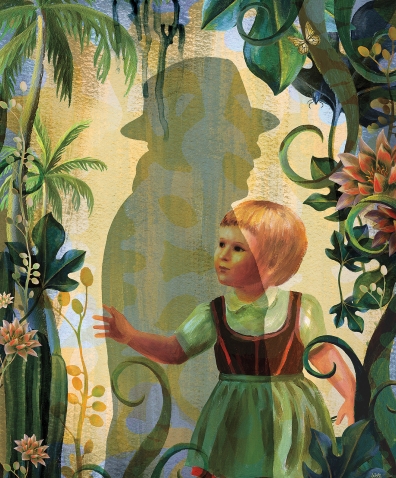



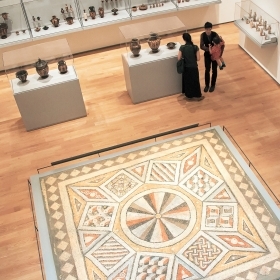
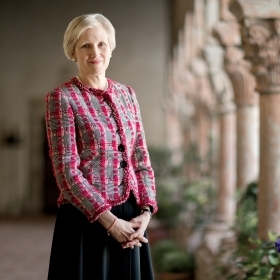

We ask that those who engage in Wellesley magazine's online community act with honesty, integrity, and respect. (Remember the honor code, alums?) We reserve the right to remove comments by impersonators or comments that are not civil and relevant to the subject at hand. By posting here, you are permitting Wellesley magazine to edit and republish your comment in all media. Please remember that all posts are public.